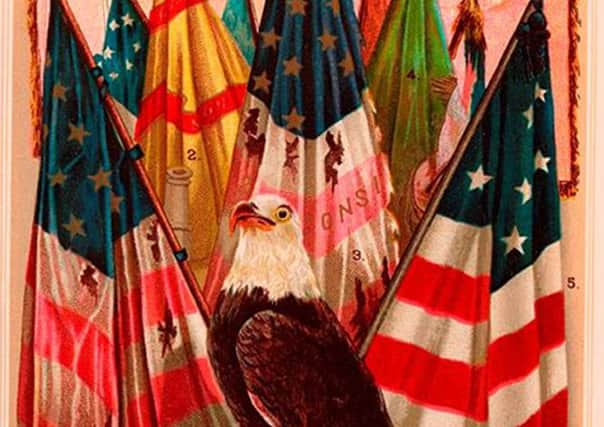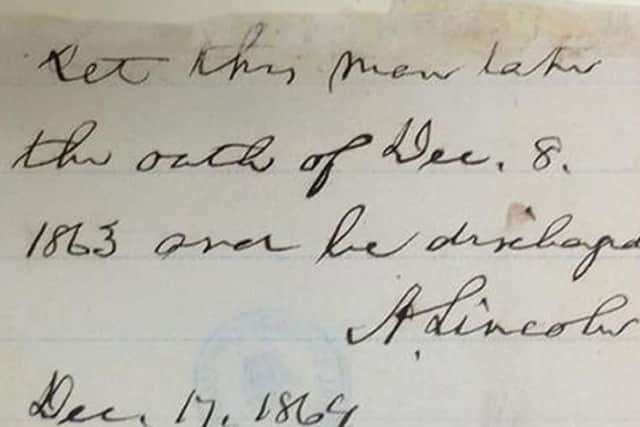Lincoln-signed letter in US Civil War exhibit


A request for the release of a Confederate prisoner of war signed by US President Abraham Lincoln is among the highlights of a new exhibition about the American Civil War.
Rare letters, political pamphlets, newspapers and memoirs also feature in the display which commemorates the 150th anniversary of the end of the conflict.
Advertisement
Hide AdThe war, which ended in 1865, tore apart the nation and killed and maimed more than a million Americans.


The display at the National Library of Scotland (NLS) uses material from its American collections to give insights into the conflict that led to the abolition of slavery in the United States.
Other highlights include the deed of sale of slave Lettice and her child Whinny for 278 US dollars (£183) in North Carolina in 1829, and the pocket diary of a Union soldier fighting in Confederate Virginia in 1862.
US and Commonwealth curator Dora Petherbridge, who curated the display, said: “150 years after its close, the American Civil War still inspires fascination and debate.
“Many people encounter the conflict through novels and Hollywood films. The cultural legacy of the war is immense. I hope the original documents in the display will offer visitors perspectives on the era that they may not have encountered before.”
From the South the conflict was seen as the “War of Northern Aggression”, but from the North as the rebellion of Southern states.
Advertisement
Hide AdScots fought on both sides, including the son of the explorer and missionary David Livingstone.
Robert Livingstone lied about his age to enlist in the Union Army in 1863. The teenager died the following year in a Confederate prison after being wounded in battle.
Advertisement
Hide AdThe display includes a letter to David Livingstone from his sister-in-law Harriette about Robert’s fate before it was known he had died.
FOLLOW US
-----------------------------------------
-----------------------------------------
SCOTSMAN TABLET AND MOBILE APPS
She wrote: “From all I can learn I conclude that Robert must be a prisoner - if so I pity him. The tender mercies of the Rebels are cruel - they are trained to the practice of cruelty from their cradles.”
The display also includes a rare signed first edition of the novel Gone With The Wind by Margaret Mitchell.
Published in 1936, the book became one of the most popular novels in US history selling up to 50,000 copies in a day. More than 30 million copies have been sold overall and the book was made into a film which remains one of the most successful in box office history.
The exhibition also includes the claim that the Scottish writer Sir Walter Scott was in part responsible for the war, even though he died 30 years before it began.
Sir Walter’s historical adventures such as Ivanhoe were very popular in America and have been seen by some as having a major influence on Southern values of birth, rank and honour.
Advertisement
Hide AdIn his travelogue Life On The Mississippi, the writer Mark Twain said: “It was Sir Walter that made every gentleman in the South a major or a colonel, or a general or a judge [...] Sir Walter had so large a hand in making Southern character, as it existed before the war, that he is in great measure responsible for the war.”
Yankee Cries and Rebel Yells: The American Civil War runs until March 22 at the National Library of Scotland, George 1V Bridge, Edinburgh. Entry is free.
SEE ALSO